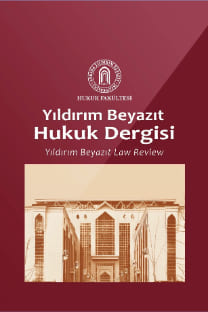ULUSLARARASI HUKUKTA BİLDİRİMİN TEK TARAFLI DEVLET İŞLEMİ NİTELİĞİ ÜZERİNE BİR İNCELEME
Tek taraflı devlet işlemleri, uluslararası hukuk, tanıma, protesto, vazgeçme, taahhüt
AN EXAMINATON ON THE UNILATERAL STATE ACT STATUS OF NOTIFICATION IN INTERNATIONAL LAW
Unilateral Acts of States International Law, Recognition, Protest, Waiver, Promise, Notification,
___
- Acer, Yücel/Kaya, İbrahim (2015) Uluslararası Hukuk Temel Ders Ki-tabı, 6. Baskı, Ankara, Seçkin.
- Belik, Mahmut R. (1966) ‘Devletler Hukukunda Hukukî Tasarruflar’ İÜHFM, C:32, S:2-4, ss. 456-466.
- BMGK, A/RES/51/160, 30 Ocak 1997.
- Bodansky, Daniel (2000) ‘What is so bad about Unilateral Action to Protect the Enivorenment’ EJIL, C: 11, S:2, ss. 339-347.
- Bozkurt, Enver/Kütükçü, M. Akif/Poyraz, Yasin (2012) Devletler Hu-kuku, Gözden geçirilmiş 7. Baskı, Ankara, Yetkin.
- Caşın, Mesut Hakkı (2013) Modern Uluslararası Hukukun Temel Esas-ları, C: 1, 1. B., İstanbul, Legal Yayıncılık.
- Cedeño, Víctor Rodríguez (1998) First report on unilateral acts of Sta-tes, A/CN.4/486, 5 Mart 1998.
- Cedeño, Víctor Rodríguez (2004) Seventh report on unilateral acts of States, 22 Nisan 2004, A/CN.4/542.
- Cedeño, Victor Rodrígez/ Cazorla, Maria Isabel Torres ‘Unilateral Acts of States in International Law’: Rüdiger Wolfrum (Editör) (2012) The Max Planck Encyclopedia of International Law, C: X, 1. B., Oxford, OUP.
- Chow, Pok Yin S. (2017) ‘Reservations as Unilateral Acts? Examining the International Law Commission’s Approach to Reservations’ International and Comparative Law Quarterly, C: 66, ss. 335-365.
- Crawford, James (2012) Brownlie’s Principles of International Law, 8. Bası, Oxford vd., OUP.
- Çağıran, Mehmet Emin (2005) Uluslararası Hukukta Devletin Tek Taraflı İşlemleri, 1. B., Ankara, Platin Yayınları.
- Çelik, Edip F. (1984) Milletlerarası Hukuk – Birinci Kitap, İstanbul, Filiz Kitabevi.
- Degan, Vladimir-Djuro (1994) ‘Unilateral Act as a Source of Particular International Law’ Finnish Yearbook of International Law, C: 5, ss. 149-266.
- Dominick, Mary F. ‘Notification’: Bernhardt, Rudolf (Editör) (1986) Encyclopedia of International Law, Vol: 9, Amsterdam, Elsevier, s. 288-290.
- Dupuy, Pierre-Marie (2000) ‘The Place and Role of Unilateralism in Contemporary International Law’ EJIL, C: 11, S:2, ss. 19-29.
- Eckart, Christian (2012) Promises of States under International Law, 1. B, Oxford, Hart Publishing.
- Evans, Malcolm D. (Editör) (2010) International Law, 3. Bası, Oxford, OUP.
- Fiedler, Wilfreid ‘Unilateral Acts in International Law’: Rudofl Bernhardt (Editör) (1984) Encyclopedia of International Law, C: 7, 1. B., Amster-dam-Oxford-New York, North Holland.
- Goodman, Camille (2006) ‘Acta Sunt Servanda – A Regime for Regulating the Unilateral Acts of States at International Law’ Australian Yearbook of International Law, C: 25, ss. 43-73.
- Gündüz, Aslan (2014) Milletlerarası Hukuk – Konu Anlatımı, Temel Belgeler, Örnek Kararlar, Ed. Reşat Volkan Günel, 7. Baskı, İstanbul, Beta Ba-sım.
- ICJ, Nuclear Tests Case (Australia vs. France), Judgment of 20 December 1974, I.C.J. Reports 1974, ss. 253-274.
- Kassoti, Eva (2013) ‘Unilateral Legal Acts Revisited: Common Law v. Civil Law Approaches and Lessons from the International law Commission's (Fa-iled) Attempt to Codify Unilateral Acts of States’, Hague Yearbook of International Law, C. 26, ss. 168-200.
- Kuzmarov, Betina (2005) ‘Unilateral Acts in International Relations: Accepting the Limits of International Law, C: 8, Yearbook of New Zealand Ju-risprudence, ss. 77-97.
- Martti, Koskenniemi (2006) From Apology to Utopia: The Structure of International Legal Argument, 1. Baskı, Cambridge vd., CUP.
- Jennings, Sir Robert / Watts, Arthur (Editörler) (1996) Oppenheim’s International Law, 9. Bası, Londra ve New York, Longman.
- Pazarcı, Hüseyin (2011) Uluslararası Hukuk, 10. B., Ankara, Turhan Ki-tabevi.
- Report of the International Law Commission (2006) Fifty-eighth ses-sion, ‘Chapter IX – Unilateral Acts of States’, ss. 159-166.
- Rubin, Alfred P. (1977) ‘The International Legal Effects of Unilateral Declarations’ American Journal of International Law, C: 71, ss. 1-30.
- Sands, Philippe (2000) ‘ ‘Unilateralism’, Values and International Law’ EJIL, C: 11, S:2, ss. 291-302.
- Shaw, Malcom N. (2016) International Law, 7. Bası, Cambridge vd., Cambridge University Press.
- Suy, Erik (2001) ‘Some Unfinished New Thoughts on Unilateral Acts of States as a Source of International Law’ Journal for Juridical Science, C: 26, S: 3, ss. 1-11.
- Thirlway, Hugh (2014) The Sources of International Law, Oxford, Oxford University Press.
- Virally, Michel ‘The Sources of International Law’: Sorensen, Max (Edi-tör) (1968) Manual of Public International Law, Londra, MacMillian, ss. 116-174.
- Viyana Andlaşmalar Hukuku Sözleşmesi - Vienna Convention on the Law of Treaties, 1969. Türkçesi: Gündüz, ss. 66-87.
- Zemanek, Karl ‘Unilateral Legal Acts Revisited’: Wellens, Karel (Editör) (1998) International Law: Theory and Practice – Essays in Honour of Eric Suy, Lahey/Boston/Londra, Martinus Nijhoff Publishers.
- ISSN: 2149-5831
- Yayın Aralığı: 2
- Başlangıç: 2016
- Yayıncı: Ankara Yıldırım Beyazıt Üniversitesi Hukuk Fakültesi
İPOTEK HAKKININ HACZİ İLE İLGİLİ SORUNLAR VE DEĞERLENDİRME
KATILIMCI DEMOKRASİNİN VASITALARI VE BU VASITALARDAN REFERANDUMUN ÇEVRE HAKKINA OLAN ETKİLERİ
TÜRKİYE’DE MÜLTECİLERİN ÇALIŞMA VE SOSYAL GÜVENLİK HAKLARI
YAPAY ZEKANIN HUKUKİ STATÜSÜ VE HUKUKİ KİŞİLİĞİ ÜZERİNE TARTIŞMALAR
MAĞDURİYETİN GİDERİLMESİ AÇISINDAN UZLAŞTIRMA KURUMU İLE MAĞDUR HAKLARI TASARISININ İNCELENMESİ
DİPLOMATİK KORUMA HAKKINDA TASLAK MADDELER
ULUSLARARASI İŞGÜCÜ KANUNU İLE GETİRİLEN BİR YENİLİK: TURKUAZ KART
ULUSLARARASI HUKUKTA BİLDİRİMİN TEK TARAFLI DEVLET İŞLEMİ NİTELİĞİ ÜZERİNE BİR İNCELEME
YABANCI MAHKEME KARARLARININ TANINMASI VE TENFİZİNDE KAMU DÜZENİ MÜDAHALESİ
